The Long Ride: Melissa Priblo Chapman Discusses Her Book “Distant Skies” (Part 2 of 2)
In the early 1980s, twenty-three-year-old Melissa Priblo Chapman rode her horse Rainy 2,600 miles alone across America. She encountered rattlesnakes, thunderstorms and Great Plains busters, but she also encountered kind ranchers like the one who hooked her up with a pack mule. Almost forty years after her trip, Melissa wrote a book about her voyage called “Distant Skies”. I recently interviewed Melissa about her book and trip.
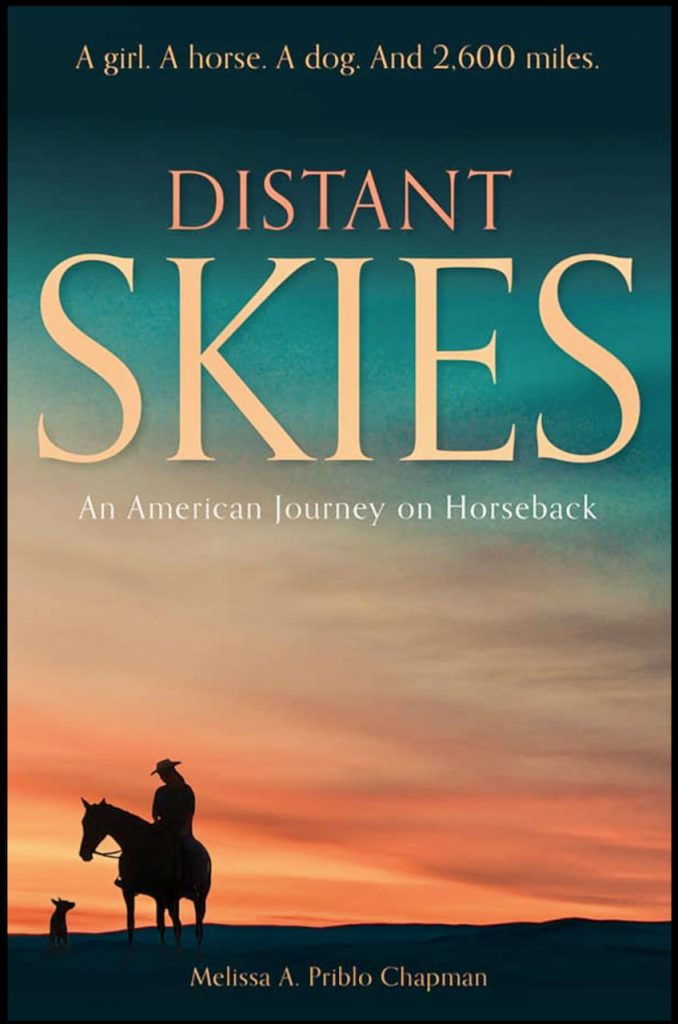
This is Part 2 of the series. In Part 1, which I posted earlier here on RiverEarth.com, Melissa talked about the technical aspects of her trip and the advice she gives her kids. In this post, Melissa and I talk about what it’s like for a woman to ride a horse alone across America, how dreams come in all shapes and why it’s never late to chase them.
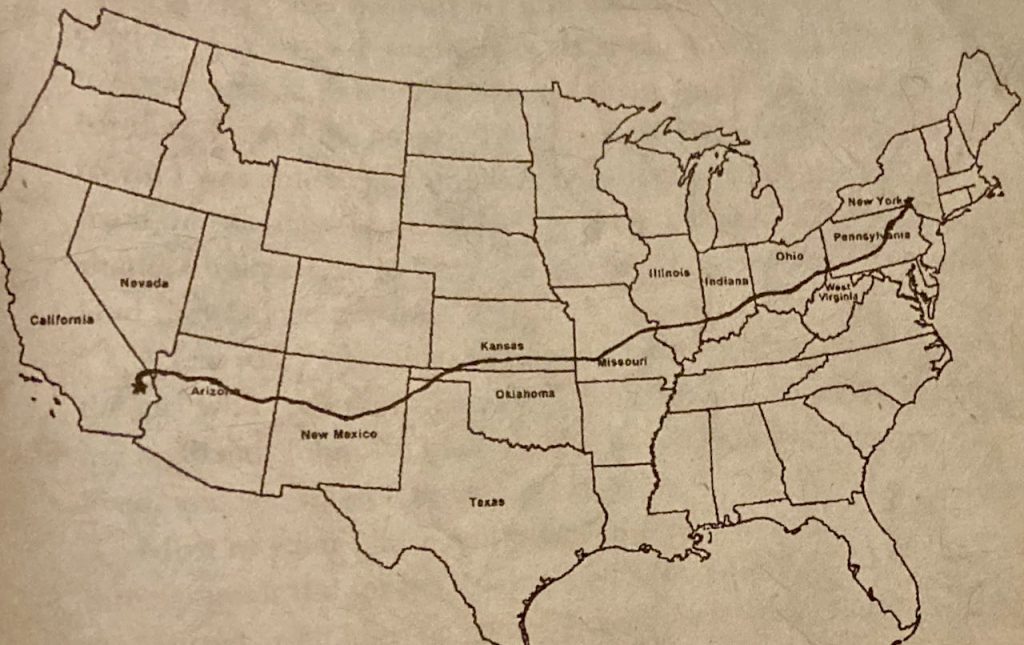
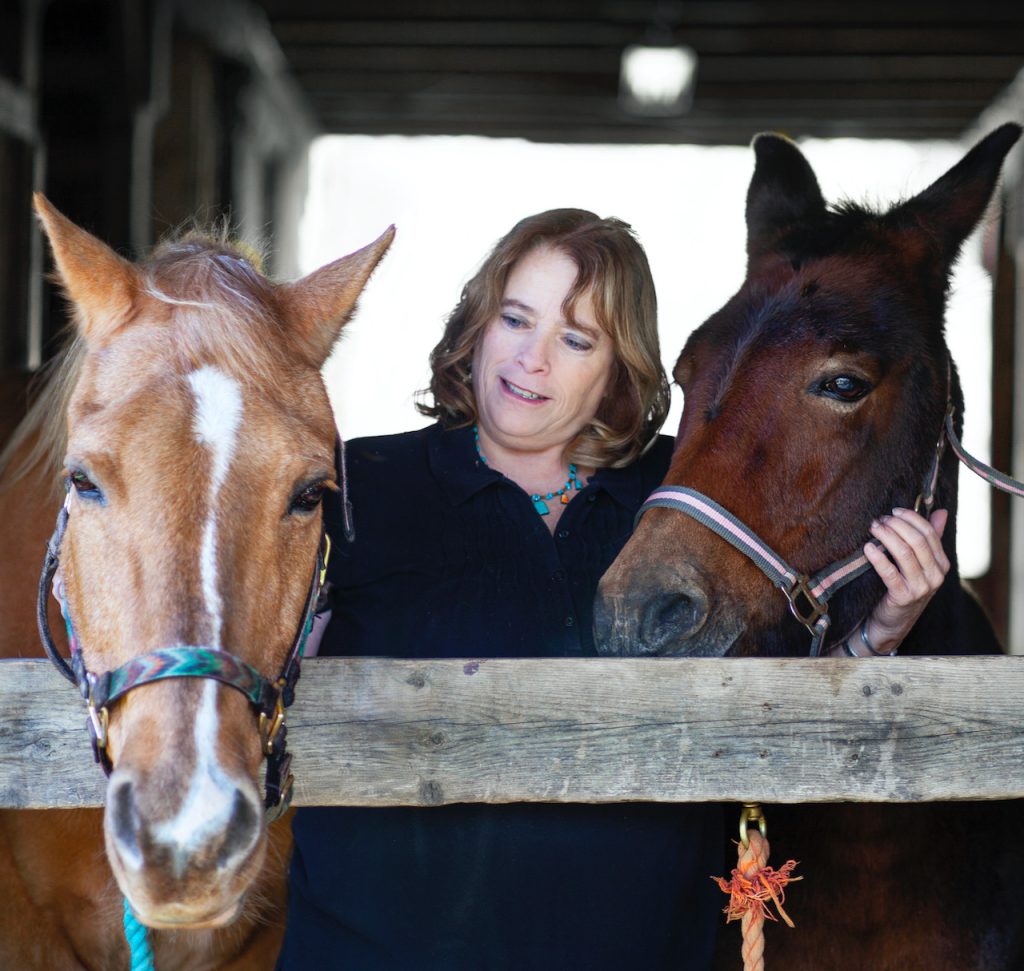
Click on the audio player below to listen to our chat. Or scroll down and read the write-up of our conversation below the audio player.
Enjoy! Bernie Harberts / RiverEarth.com
(Read and listen to Part 1 of our conversation here)
Note: conversation has been lightly edited for readability. All photos courtesy of Melissa Priblo Chapman.
Listen to the Interview
What It’s Like to be Invisible
Bernie Harberts
“One of the early sections of “Distant Skies” was called Ghost. You wrote about how you were on your ride, and you felt like you were invisible. Explain what that felt like.
Melissa Priblo Chapman
I remember the exact story you’re talking about. I had stopped to get ice cream at a little country place. There was a picnic table and a little grassy patch, and Rainy was grazing. And across the road, I could see kids playing baseball, and you could hear the people cheering and stuff. And it was the first time that I got the sense that they were with families, that they were with their neighbors.
I’m just by myself, and I’m figuratively and literally on the outside of that now. Like, I can sit here and watch them, but no one sees me. If you want to get attention on a horse, you can. But I had purposely picked a quiet, shady spot to let Rainy eat a little grass. It was like, nobody knows we’re here. We’re just sort of listening and watching, but we’re not part of it. There was that sense of being untethered, like a floating balloon, and you still could look down and be around, but you weren’t in the game, the family, or the dinner. It was both unsettling and exciting because there’s a freedom with that.
Traveling Alone
Bernie
How does traveling alone compare to traveling with company?
Melissa
I’m very compatible with my husband and kids. I’ve got good friends. But when you travel with someone, you’re always asking them, “Are you hungry? Do you wanna go? Do you wanna stop?”
There’s nothing wrong with that. I’ve had great trips with people. But there’s something very freeing about just listening a hundred percent to your own self.
And then you’d have like the complete opposite. People would invite you into their homes. I’m kind of a sentimental person. I feel my emotions deeply, and I get attached easily. I tried to make sure that Rainy and then later my pack mule Amanda had rest time. Like we didn’t go, go, go every single day.
And so these people I stayed with just sort of adopted us into their family. And we’d leave, and we’d all be crying and stuff. So it was this weird contradiction. I was okay being alone, but I was also very open to these nice connections with people, too.
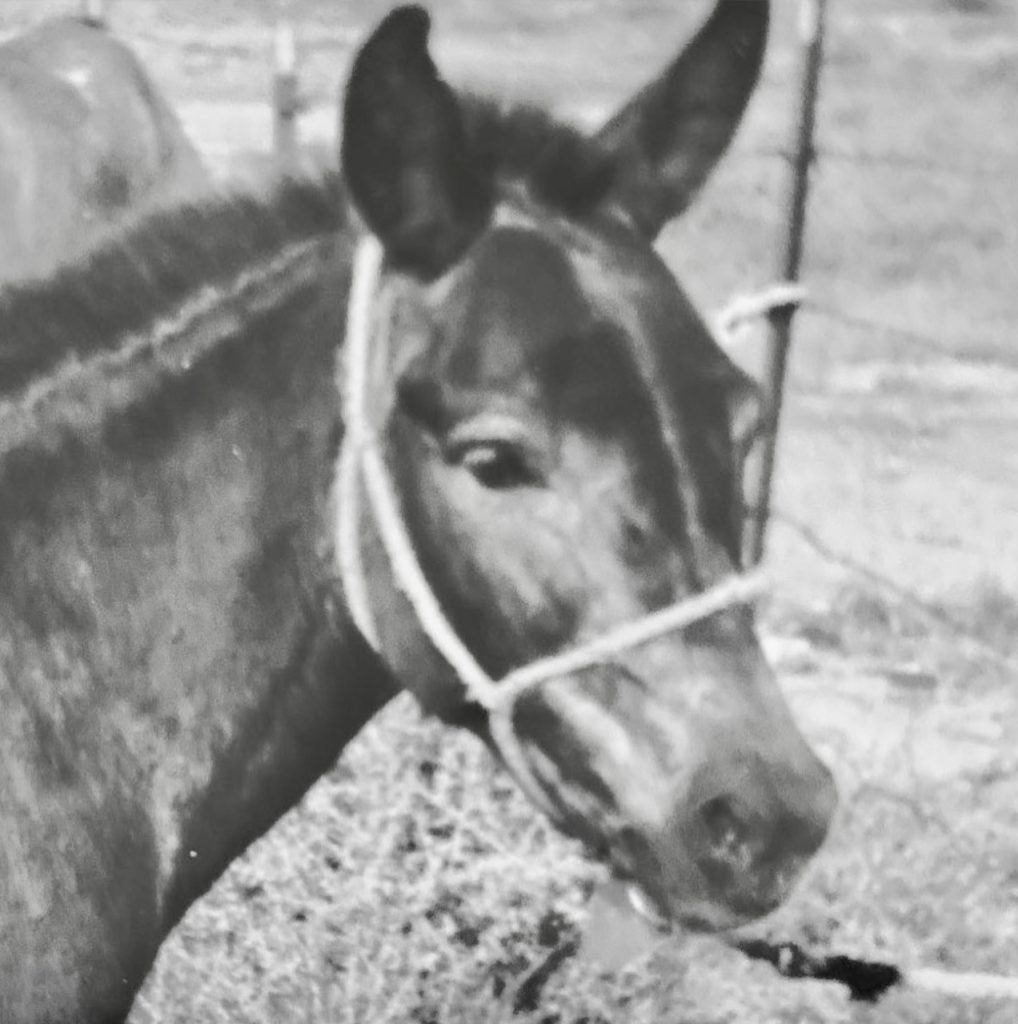
Finishing The Trip
Bernie
Describe what it’s like, toward the end of your trip, to feel like your trip can’t last forever and that it’s time to go home.
Melissa
I cried when I wrote the end of the book. It was years later. That ending just was like, I didn’t ‘t want my trip to stop.
There used to be people that said I took my trip because I was running from something. I didn’t feel that way. I just felt called to be out there and be part of the outside world for a while with my horse.
We talked earlier about how the first day of my journey was the worst day of my whole trip because it was such a big adjustment.
It was just like any other big change in your life, like getting married, or going off to college or bringing home a new baby. It’s a big adjustment. Nobody forces you to do any of those things. You choose it, but you’re still adjusting. And so, beginning my ride was an adjustment, but then living like that became my life.
Readjusting to Coming Home
Bernie
What was it like to come home after your trip?
Melissa
After my trip was over, I had to readjust the life I had left behind. I don’t know if I ever adjusted a hundred percent back to it, even 40 years after I finished my ride. I still have dreams of the roads rolling out in front of us. It still calls to me.
The end was very difficult for me. It was hard because I got a lot of media attention. I had to do interviews and answer questions. And there was this part of me that just was like,” Now what? Who am I without my trip? Who am I doing something else besides this?”
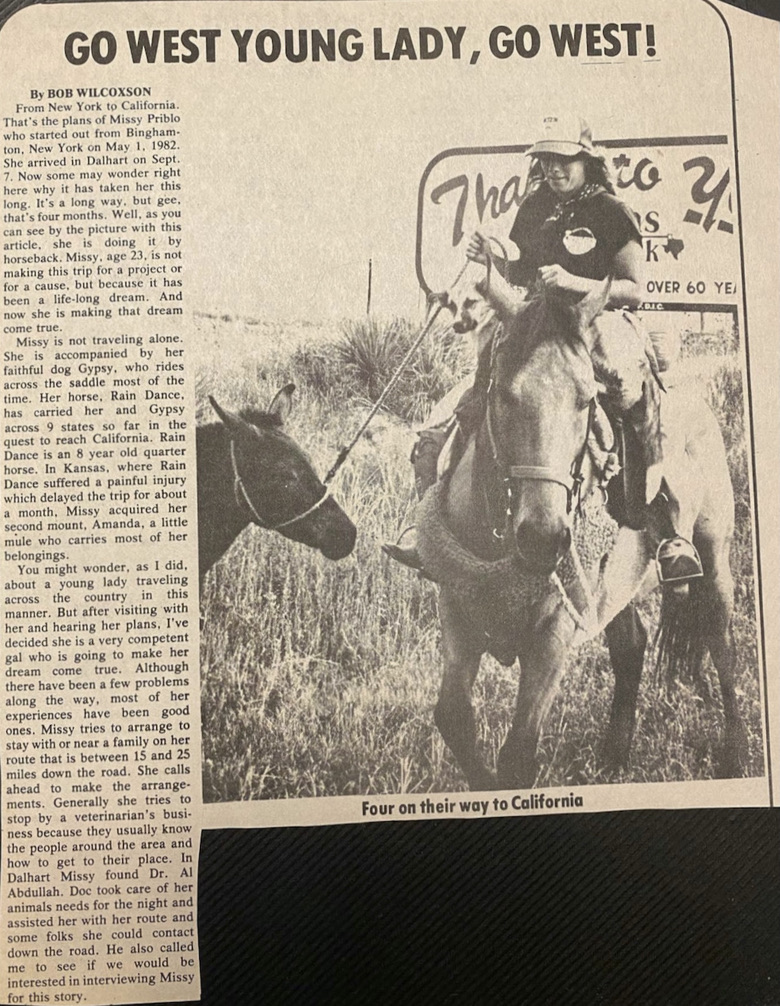
That was a critical phase of growing, from being a young person to being an adult. Some people get a career. They go to college, or they get married. That’s what I did. That was how I became an adult, being out on the road like that. It was a very difficult adjustment coming back. And sometimes it still is! Luckily I have a very understanding spouse. We had kids, and money was always not plentiful, and I said, when my last kid goes to school, I’m going West. I wanted to revisit some of the places I visited on my trip. And that’s exactly what I did. Luckily, like I said, I have a good husband who’s like, “I get it. That’s you.”
And I went by myself and, oh, it was so beautiful. There was a great sense of an ending.
Starting From a Good Place
Bernie
One of the things that struck me about your book was that you wrote that you came from a happy family situation. Many people set off on voyages to overcome personal pain, but that wasn’t the case with you.
Melissa
Yeah. It was a great life. I didn’t come from a point of damage, and I still took this trip. I also understand where people are all messed up and need to take a therapeutic trip.
Bernie
I respect that all sorts of people take trips for all kinds of reasons. It’s also good to hear that you don’t have to be broken or damaged to take an amazing trip. I had two wonderful parents and didn’t travel to overcome trauma. I travel because I like to travel.
It’s Just Me and This Horse and This Dog
Bernie
Many people riding a horse across America these days have a cause. You didn’t. How did you explain to people what you were doing?
Melissa
During my trip, somebody stopped, took a picture of me, asked if I needed anything and gave me a can of soda. Then they asked me, “Are you part of a race? Are you doing this on a dare or something?”
I said, “Nope.’
And they said, “Are you, like, in a challenge?”
I said, “Nope.”
And they said, “Are you raising money for something?”
I said, “Nope.”
They said, “Are you spreading the word of the Lord?”
I said, “Nope.”
Finally, I just said, “It’s just me and this horse and this dog. We’re just going. This is what we do. We’re just going every day. This is my life right now.”
They laughed at that like they were so surprised that there wasn’t a cause or a reason.
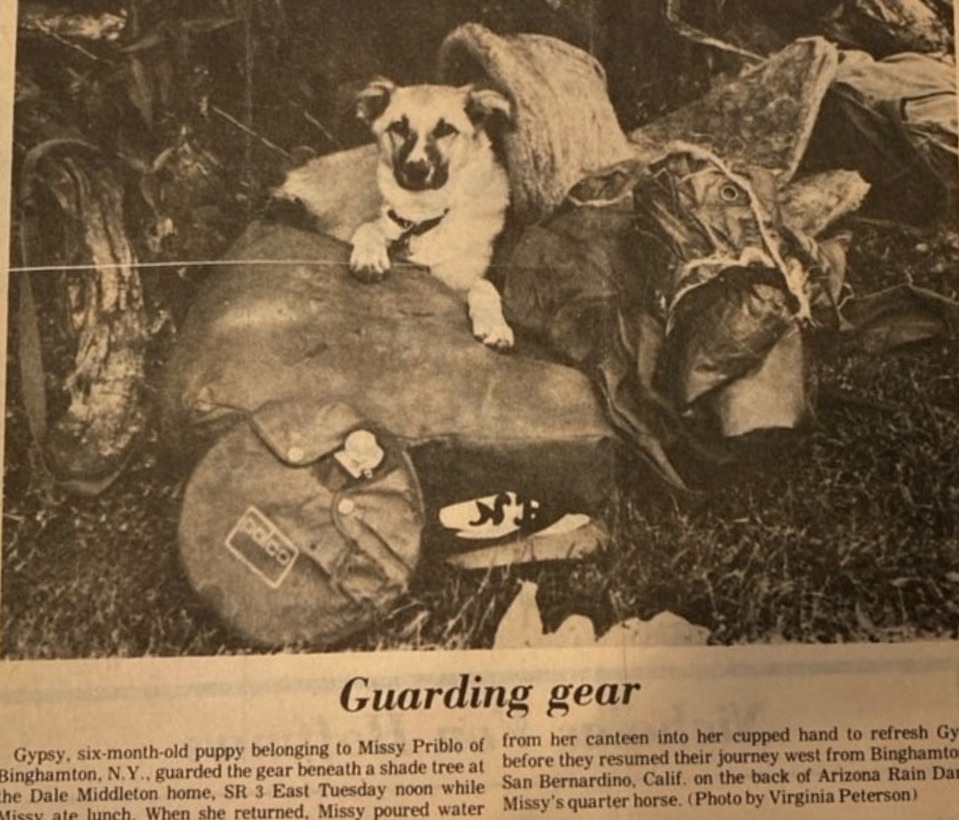
Bernie
That’s such a beautiful message in this very cause-driven society. Goodness knows there are good causes that need supporting. But you know, it’s becoming kind of rare that someone says, “I’m just gonna go ride a horse a long distance,” and then they go off and do it without raising money or awareness.
A Woman Riding Alone
Bernie
What’s it like for a woman to ride a horse across America? I ask because people who hear I’ve ridden across America on my mules say, “Well, it’s easy for you because you’re a man.” Then I tell them that I know of as many women as men that have ridden across the country, women like Bernice Ende, Lisa Wood, Linda Losey, you and Annie Wilkins, who wrote a great book called “Last of the Saddle Tramps”*. They’ve all done fine.
Melissa
I think being male works for you because you’re not vulnerable to certain crimes and issues that women are. But it also works against you because people trust women more. I come from a kind family, and I would help someone anyway. My trip solidified in me that I will never ever drive by someone that’s in trouble.
My husband’s a police officer in Binghamton, near where we live. One day he came home and said, “There were some people riding bikes across the country, and they were looking for a place to camp, and I sent them to such and such.”
I said, “What? You know how I feel about that! You should have brought them here! We have food. We have a place for them to stay.”
How do you not “pay it forward,” as they say?
We don’t see too many hitchhikers anymore. But I’m way more likely to help if I’m by myself and it’s a female instead of a male. It’s common sense. So I think men have that disadvantage.
People saw me as a 120-pound, five-foot-two-inch female homesick by myself. They were like, “Oh, let her in!”
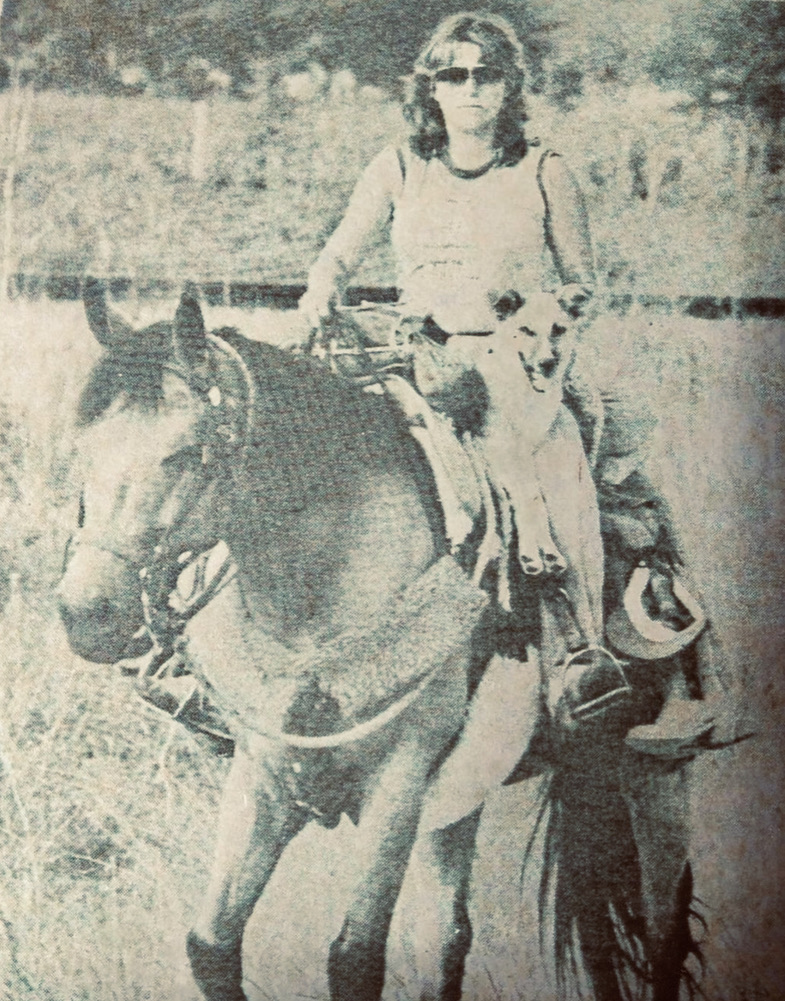
To Carry a Gun or Not
Bernie
I don’t carry a gun on my saddle voyages. What are your thoughts on carrying a gun on a horse journey? You started your trip without a gun and were given one along the way. I love the story where the cop pulls up and asks to speak with you, and you’re thinking, “Oh, no. What did I do?” Then he gives you a pistol. Talk about not seeing something coming.
Melissa
Right! That’s only gonna happen in Texas!
The truth of that is that somebody gave me a gun, and I carried it. I also didn’t have a clear idea of what kind of country I was heading into. It was much, much rougher than I had realized. But not from humans.
People always asked me, “What was the scaredest you ever were?” I could tell them stories about storms and snakes, but almost never about humans.
If I was going to start off again on a long saddle journey, I would not have a gun with me. They’re not in my comfort zone. It would not be a requirement for me to have a gun.
What Happened to the Gun
Now I’ll tell you something funny. I saved the pistol that cop gave me because I saved everything from my trip. And I started dating my husband, who was a police officer when I met him. We were in New York state, which has some of the toughest handgun laws in the country. He learned about the gun, and he said, “You have it here?”
I said, “Yeah.”
He said, “Wait. Like you just have that in your drawer or something?”
I’m like, “Yeah! It’s not loaded.”
And he said, “Do you know it’s a mandatory jail sentence of a year for an unregistered handgun?”
And I’m like, “No….”
The gun got broken into pieces, so that’s what happened to that.
The Chain of People
Bernie
One thing that fascinated me is what you refer to as a chain of people that you meet on your trip. In the East, each link in the chain was 10 to 20 miles long, the distance you traveled between people that put you up for the night. Out West, the links were longer because people lived farther apart. Or the links “broke” because you spent the nights in the desert or away from people because nobody lived where you were traveling.
Talk a little more about that chain of people.
Melissa
That chain of people symbolizes the connectedness of all of us. When I started my trip, my farrier found a place for me to stay on the first night of my ride. They were a family he knew and they had a big barn, and they had a daughter my age. My farrier said, “Let’s get you there.”
I didn’t quite make it, but I found another place, though, that set up a stall for me.
I didn’t meet the family my farrier had arranged for me to stay with until my second day out. They put me up, and as I was leaving the next day, they said, “Well, we feel kind of funny just sending you off and not knowing where you’re gonna be tonight. We’ve got friends from showing 4-H down in Springville. That’s another 20 miles. They’ve got a farm.”
They called ahead and got me a place to stay with their friends, so I rode to there the second day.
So that chain of people that helped me started 20 miles from my home. People would say, “I’d feel better knowing you had a place to stay.” They’d call around and find a place for me to stay. I ended up having people drive around looking for a place for me to stay, like going to a campground and asking if a horse could stay there.
People Stepping in to Help
I remember once in Texas, somebody drove up and said, ‘”There’s nothing up the way you’re riding. I’m gonna come back with some buckets of water in my truck.” Which they did.
Another time a person said, “You’re not gonna make it by dark anywhere with a house or a town or anything. But, you know, my buddy Phil has cattle pens, and you can put your horse there.”
So out West, even when people were spread thing, that chain of people was still kind of going. To me, it symbolizes that people care. My trip made people feel good because it showed them that people were kind.
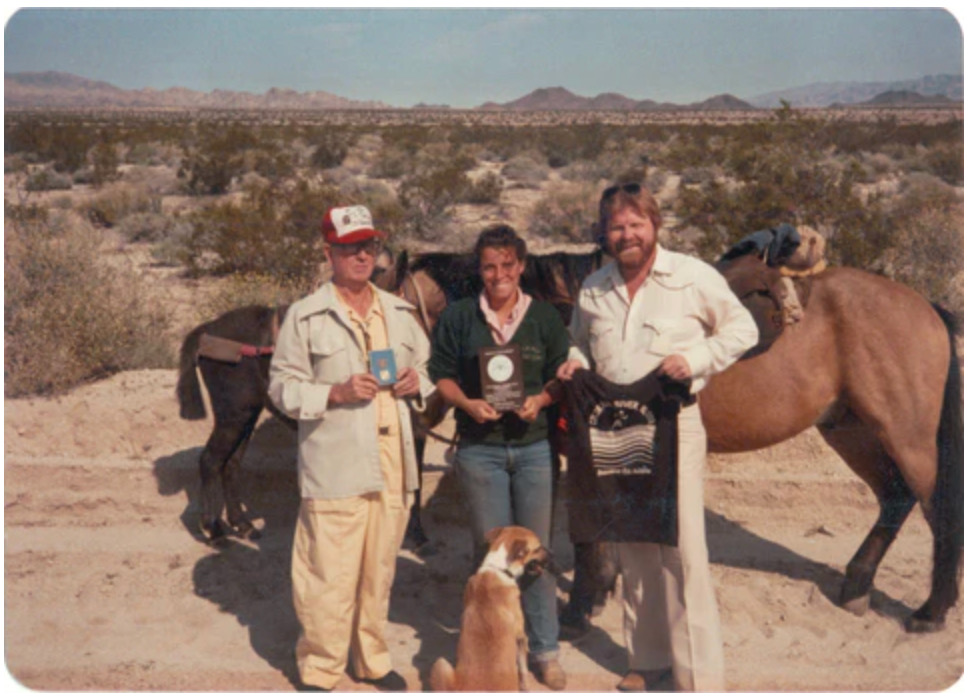
Go After Your Dreams
Melissa
My trip also said something about going after your dreams. Somebody else may have had a totally different dream. Maybe they always wanted to open a restaurant or write a book. Someone recently told me, “I always wanted to write a book. I had this idea since I was a kid, but I’m in my fifties, so it’s probably too late.
I said, “Well, guess what? I’m older than that, and it’s not too late.”
People liked being a part of that, and they were a part of my journey. They kept the loneliness at bay. They kept us fed and safe.
The Side Effects of Caring
Melissa
A neat thing that I don’t think was in the book was the side effects of that caring. People called my parents. It started way back in Pennsylvania, right at the start of my trip.
I was riding along one day. It was really hot, and I met a guy, and he said, “Where are you going?” He could see the horse was all packed up, and I was only like 50 miles from my hometown.
And I said, “California.”
“Well,” he said, “come and eat lunch with us. My wife’s inside.”
They had a new baby, and we took a picture, and I wasn’t even there for an hour.
They sent me on my way with good wishes and a sandwich. I talked to my parents on the phone later, and they said, “Hey, these people called us. They said they put you in their prayer chain at church. They told us that they’re driving down to Hughesville, and they’re gonna make sure you get in the fairgrounds at night to stay.”
It touched my parents because they were very worried. And just like that, my parents started having these people they would talk to that were just people we met on the trip. It was caring for someone who gets to pursue their dream and being part of that.
Bernie
That’s beautiful. People need to know that in this incredibly divided, polarized, compartmentalized, siloed, screened-off world, a person can still set off on a horse, start a restaurant, write or book, or do whatever it is they dream of doing.
Living Like a Bumper Sticker
Bernie
What’s different about the era you took your trip, the early 1980s, and now?
Melissa
One of the things that is different about the era we live in now is that we’re living bumper stickers. Whatever you believe in, whatever you like or don’t like – people are posting about it and sending messages or putting out comments about it. I feel bad that social media has done that.
I’m not afraid of controversy, and I’ll stand up for my beliefs, but I don’t feel like that’s the first thing we have to know about each other. The human element is what’s inside. We’re just having a lovely conversation. We don’t know who we voted for or if you go to church. Who cares about that stuff?
Now it’s like our whole life is a bumper sticker of what we feel. And so right away, I think, “Oh, I’m not going to that house because I didn’t vote for that guy.”
It’s sad that we’ve gotten so that part is too open. I don’t ever post anything like that or talk about that until maybe the right time. I’m not afraid to. I just don’t think that has to be the first thing we all know about each other. There are deeper, more meaningful things to talk about.
Bernie
That was crystal clear to me on the road with my mules. You wouldn’t knock on somebody’s door and ask for water and then start talking to someone about politics. That sort of politeness goes back to an era of long ago. That’s been lost in some circles but not all of them.
Dreams Are of all Sizes
Bernie
If there’s one thing you would tell people based on what you learned on your trip, what would it be?
Melissa
Dreams are all sizes. The outdoor life and the animals have enriched my life. You don’t have to ride cross country for the outdoors and animals to be part of your life. I would recommend that everyone find even small ways to make that part of their life.
My trip took place decades ago, and I hear this next thing all the time. I get to the end of my talks, and people say, “Yeah, but you can never do that now.” Or they say, “Oh, well, you were young. Of course, it was easy.”
There’s a woman from my area, and she was older, a little rough around the edges, and she did a similar long distance ride. And then there’s a newsman that was interviewing me. He said, “When I was 22, I bought a motorcycle and didn’t know how to drive it. Two weeks later, I took off to go cross country.” His parents were all upset. And sure enough, he’s in Colorado, spills the bike and has an accident. The first pickup truck that comes by is some cowboy. He puts the motorcycle in his truck, goes to his house, and his wife cleans him up.
My point is it’s not about being a young girl or the era. Here are three different people with different personalities in different eras taking different types of trips. We all have the same stories of people reaching out. We have stories of people seeing a person in need and not being able to just go on by and not help. That will always be that way.
I encourage people that if they have an adventure or dream inside them of any size, it’s worth giving it a try.
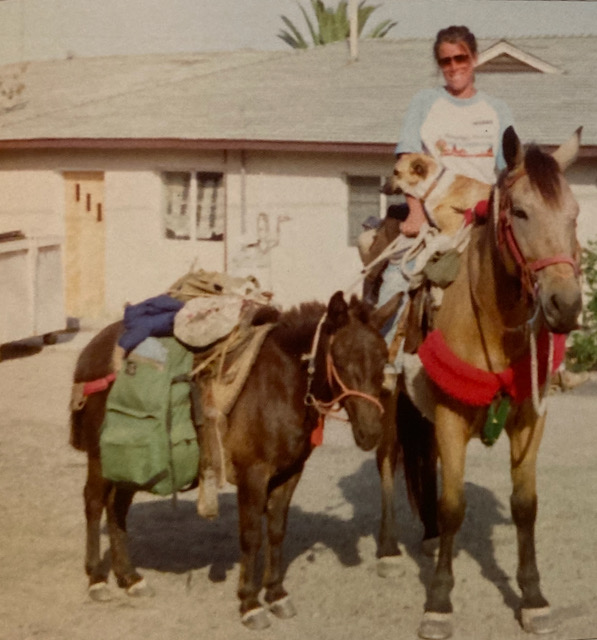
*The book “Ride of Her Life” by Elizabeth Letts is based on Annie Wilkins’ ride.
Thanks, Melissa
Thanks, Melissa, for taking the time to chat with me. As a kindred Long Riding spirit, it was lovely to compare notes from the road and learn how things have and haven’t changed in the forty-plus years since you rode Rainy across America. I look forward to catching up with you up the road!
Read and Listen to Part 1 of Melissa’s Interview
You can read and Listen to Part 1 of Melissa’s Interview right here.
Listen to Long Rider Filipe Masetti Leite Talk About His 16,000-mile Horse Journey
If you enjoyed reading about Melissa’s journey, you’ll enjoy listening to Filipe Masseti Leite talk about riding across North and South America.
I had a chance to talk with Filipe about his journey, and you can listen to our chat right here.
Buy a Copy of Melissa’s Book “Distant Skies: An American Journey on Horseback”
I enjoyed “Distant Skies” so much that I read it twice. Buy your copy on:
Sign up to Hear When my New Book is Published
I’d love to give you a heads up when my new book “Two Mules to Triumph” is published.
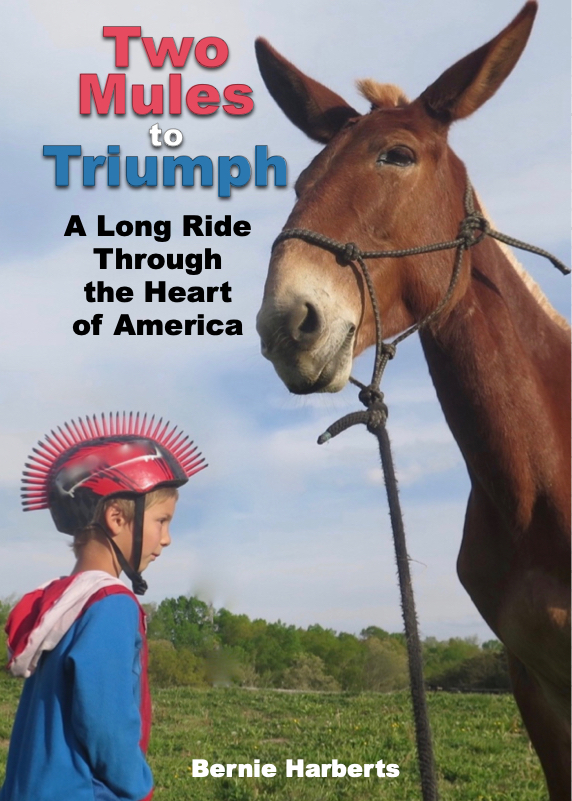
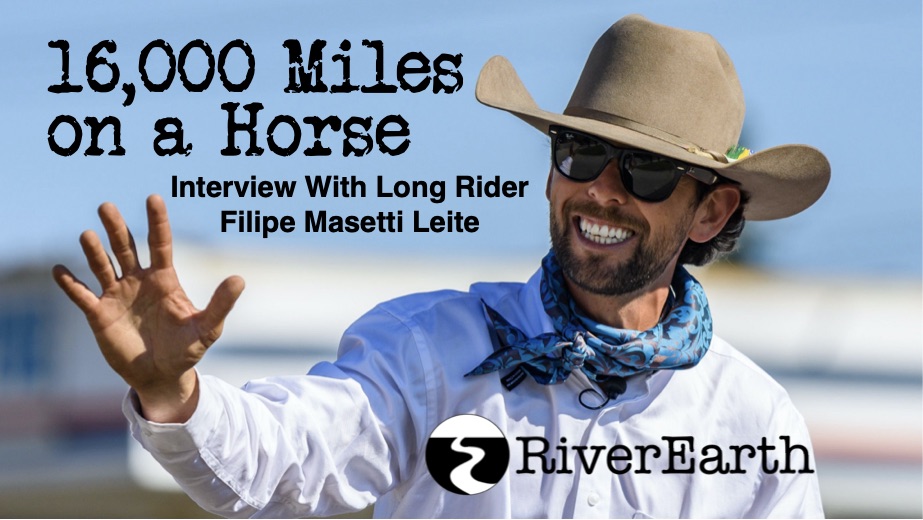
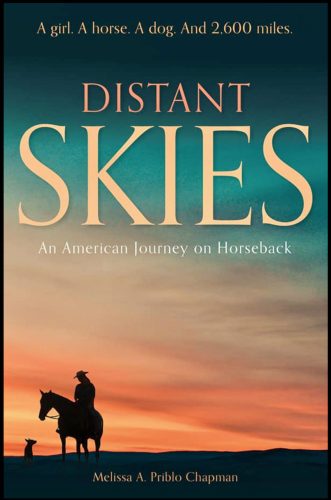
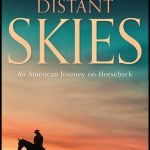
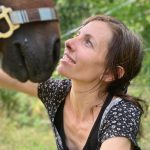
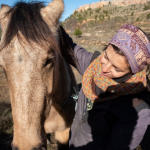
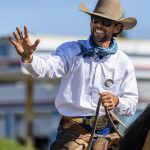




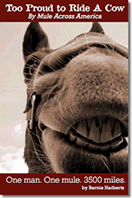
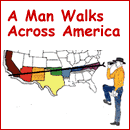
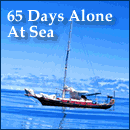
[…] Part 2 “Distant Skies: An American Journey on Horseback” by Melissa Priblo Chapman / published by Trafalgar Square The Long Riders’ Guild (The Guild is an academic, not a commercial, endeavour whose mission is to protect, preserve and promote the ancient art of equestrian travel. It has mentored or equipped Long Riders on every continent except Antarctica.) […]
[…] Part 2 “Distant Skies: An American Journey on Horseback” by Melissa Priblo Chapman / published by Trafalgar Square The Long Riders’ Guild (The Guild is an academic, not a commercial, endeavour whose mission is to protect, preserve and promote the ancient art of equestrian travel. It has mentored or equipped Long Riders on every continent except Antarctica.) […]
[…] Skies”: Melissa Priblo Chapman Discusses Her New Book (Part 1 of 2) The Long Ride: Melissa Priblo Chapman Discusses Her Book “Distant Skies” (Part 2 of 2) What is the Long Riders’ Guild 16,000 Miles on a Horse: Interview With Long Rider Filipe […]
Bernie, I probably have read most all of the books out there on long riders and have already read Melissa’s book. Your interview add insights that the book doesn’t have. I knew Bernice Ende and have spent sometime at her place in Trego, MT before she sold it. One thing that is glaringly evident, not mentioned, is that those who go on long rides are not encumbered with mortgages, or in-firmed and needy spouses.Hence, I just take week long pack trips with my horse and two mules. Please post more stuff. Thanks, Ed
Great hearing from you Ed.
I’m happy to hear you enjoyed my interview with Melissa. One of the things that’s really hard about writing books is keeping things concise and in that paring back, many important things don’t make the cut. I’m dealing with that right now with my new “Two Mules to Triumph” book.
It was wonderful to chat with Melissa and have a look at her trip from a different angle because that allowed us to talk about some of the topics that didn’t make the book.
Some of life’s greatest pleasures simply come from making the best use of the time we have on hand. I loved hearing you’re enjoying week-long pack trips with your horse and two mules. A week is a magical block of time in that it’s long enough to get into an experience and yet not so long that the life you left behind falls apart.
I agree that, in many cases, the less a person has, the easier it might be to take a long voyage. Might be. I’ve been blessed that my wife Julia has come on some of my trips. I’ve also squeezed in trips between taking care of aging parents. On this topic, I think you’ll really enjoy an interview I’m about to post. It’s with Long Rider Filipe Masetti Leite, who rode 16,000 miles across both Americas. I posted my interview here (link: https://riverearth.com/16000-miles-on-a-horse-interview-with-long-rider-filipe-masetti) but have finally transcribed our talk. Filipe talks about how he spent two years overcoming challenges he faced before he could set off from Calgary to Brazil (no horses, no financing, no Long Riding experience, etc) . That post will be up in the next week or so.
On a final note, I think it’s wonderful you knew Bernice. I will always regret not reaching out to interview her while I had the chance.
Have a great day, Ed, and keep enjoying those week long pack trips!
Bernie Harberts / RiverEarth.com